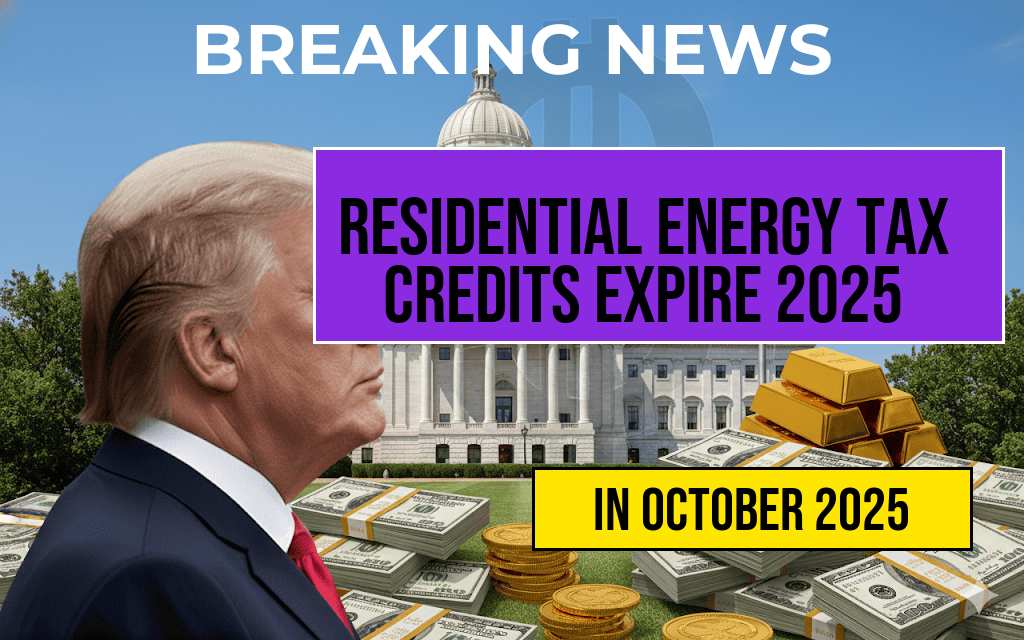As the world increasingly prioritizes sustainable practices, residential energy tax credits have emerged as a vital incentive for homeowners seeking to invest in renewable energy technologies. However, these credits are set to expire after 2025, raising concerns among environmental advocates and homeowners alike about the potential loss of financial support for green energy initiatives. The federal government implemented these tax credits to encourage the adoption of solar panels, wind turbines, and energy-efficient home upgrades. With the deadline approaching, many are urging legislators to reconsider the expiration and extend these benefits to ensure a smoother transition to a greener economy.
The Importance of Residential Energy Tax Credits
Residential energy tax credits have played a significant role in promoting the use of renewable energy. According to the U.S. Department of Energy, these credits allow homeowners to deduct a percentage of the cost of qualified energy efficiency improvements from their federal taxes. Commonly covered improvements include:
- Solar energy systems
- Wind turbines
- Geothermal heat pumps
- Energy-efficient windows and doors
This financial incentive has led to a significant increase in renewable energy installations across the country, with solar energy alone seeing an exponential rise in adoption. According to a report from the Solar Energy Industries Association, the U.S. solar market has grown more than 167% in the past five years, largely due to these tax incentives.
Impact of the Expiration
The impending expiration of these credits could have far-reaching consequences, particularly for homeowners who are considering making green energy investments. Many industry experts fear that without these incentives, the pace of adoption for renewable technologies could significantly slow down. Homeowners may face higher upfront costs for installations, deterring them from making environmentally friendly choices.
Potential Economic Ramifications
Experts predict that the cessation of residential energy tax credits could lead to job losses in the green energy sector. The Solar Foundation’s National Solar Jobs Census reported that the solar industry employed over 250,000 workers in 2020, and many of these jobs rely on the continued growth of solar installations. A slowdown in demand could jeopardize employment in this rapidly growing field.
Advocacy for Extension
In light of these potential consequences, various advocacy groups are mobilizing to rally support for the extension of residential energy tax credits. Organizations such as the Natural Resources Defense Council (NRDC) are urging lawmakers to prioritize sustainability and climate change initiatives. The NRDC argues that maintaining these incentives is crucial not only for environmental reasons but also for economic stability in the renewable energy sector.
Many homeowners are also expressing their concerns. A recent survey conducted by the PVMagazine revealed that nearly 75% of respondents would be less likely to invest in renewable energy systems if tax credits were eliminated. This sentiment underscores the importance of these incentives in driving consumer behavior toward greener choices.
What Homeowners Can Do
As the deadline for these tax credits looms, homeowners interested in renewable energy solutions should consider taking action sooner rather than later. Below are some steps that can be taken:
- Research Options: Investigate which renewable energy systems are eligible for tax credits.
- Consult Professionals: Speak with solar installers or energy efficiency experts about potential savings and financing options.
- Act Quickly: Begin the installation process well before 2025 to ensure eligibility for the credits.
Conclusion
The impending expiration of residential energy tax credits poses a significant challenge for both homeowners and the renewable energy sector. As advocates push for an extension, the urgency for homeowners to act grows. Whether through lobbying efforts or personal investment in renewable technologies, the coming years will be crucial in determining the future of green energy incentives in the United States.
Frequently Asked Questions
What are the Residential Energy Tax Credits?
The Residential Energy Tax Credits are tax incentives offered by the government to encourage homeowners to invest in renewable energy systems, such as solar panels, wind turbines, and energy-efficient appliances.
When do the current energy tax credits expire?
The current residential energy tax credits are set to expire after 2025, which means homeowners will need to take advantage of these benefits before the deadline.
How can homeowners benefit from the green energy tax credits before they expire?
Homeowners can benefit by installing eligible renewable energy systems and claiming the associated tax credits on their federal income tax returns before the 2025 expiration date.
What types of renewable energy systems qualify for these tax credits?
Eligible systems include solar energy systems, wind turbines, geothermal heat pumps, and certain energy-efficient improvements to homes, such as insulation and energy-efficient windows.
Are there any plans to extend the Residential Energy Tax Credits past 2025?
As of now, there have been no official announcements regarding an extension of the Residential Energy Tax Credits beyond 2025, making it essential for homeowners to act quickly if they wish to take advantage of these benefits.

Leave a Reply